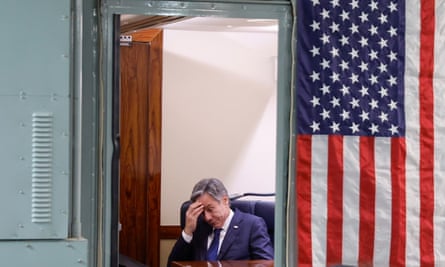US secretary of state Antony Blinken will hear demands for an immediate ceasefire in Gaza when he meets Middle East foreign ministers in Jordan, the country’s foreign ministry said. Blinken’s visit came as a US official said talks about a “very significant” pause in fighting are under way, despite Benjamin Netanyahu’s promise that such a plan would be refused unless the hostages being held by Hamas are released.
Blinken arrived in Amman late on Friday after leaving Israel empty-handed in his efforts to secure humanitarian “pauses” in its war with Hamas. On Saturday, he will join a meeting of foreign ministers of five Arab countries which will also be attended by a representative of the Palestinian Authority (PA) led by Mahmoud Abbas.
Earlier on Friday, Blinken, flew into Israel to urge the Israeli prime minister to temporarily stop its military offensive to allow aid into the territory amid rising concerns over civilian casualties as the fighting intensifies.
US officials have said they hope a pause in the fighting will allow humanitarian aid to reach desperate civilians in Gaza and help negotiations to free the more than 240 hostages seized by Hamas during the attack.
However after meeting Blinken, Netanyahu warned there could be no “temporary truce” in Gaza unless Hamas releases the hostages it holds.
Despite Netanyahu’s statement that the offensive in Gaza would continue “with full force”, a senior White House official said talks on a pause in fighting remain ongoing.
In a briefing to reporters on Friday night, the official said that to get hostages out will “require a fairly significant pause in hostilities,” and that is something under “very serious and active discussion.”

The US official, who spoke on condition of anonymity, said Washington was in constant dialogue with Israel, “asking hard questions” on points such as “the objectives you’re seeking, and an honest assessment of whether you’re achieving them.”
In a recent call with US President Joe Biden, King Abdullah of Jordan stressed the need for a ceasefire in Gaza and an immediate humanitarian truce so aid can be delivered.
On Friday more than 5,000 Jordanians demonstrated in Amman, calling on the king to press for a ceasefire. Protesters also want him to use Jordan’s peace treaty with Israel as leverage.
On Wednesday, Jordan recalled its ambassador from Israel in protest at Israel’s attacks on Gaza. Israel said it regretted Jordan’s decision.
The month-long war was triggered when Hamas militants launched a bloody raid across the border into Israel on 7 October. Israeli officials say the militants killed more than 1,400 people, mainly civilians, and took 241 hostages.
The health ministry in Hamas-run Gaza says more than 9,220 people have been killed in Israeli bombardments since then, most of them children or women.
On Friday evening, the health ministry reported that an airstrike had hit a convoy of ambulances outside Gaza’s largest hospital, killing 15 people and injuring 60 others.
The Israel Defence Forces (IDF) said they carried out an airstrike on an ambulance they said was being used by Hamas, adding that “a number of Hamas terrorist operatives” were killed in the strike.
Hamas official Izzat El Reshiq said allegations its fighters were present were “baseless”. Ashraf al-Qidra, spokesperson for Gaza’s health ministry, said the ambulance was part of a convoy that Israel targeted near Gaza City’s al-Shifa Hospital.
Reuters and Agence France-Presse contributes to this report